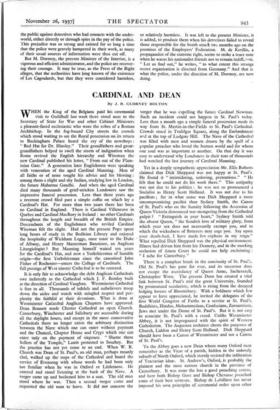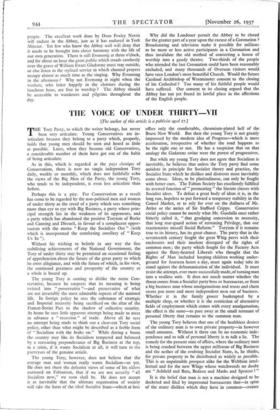CARDINAL AND DEAN
By J. R. GLORNEY BOLTON
WHEN the King of the Belgians paid his ceremonial visit to Guildhall last week there stood next to the Secretary of State for War and other Cabinet Ministers a pleasant-faced ecclesiastic who wore the robes of a Roman Archbishop. In the fog-bound City streets the crowds which stood waiting to see the Royal procession on its return to Buckingham Palace heard the cry of the newsboys : " Red Hat for. Dr. Hinsley." Their grandfathers and great- grandfathers helped to swell the storm of indignation when Rome revived the English hierarchy and Wiseman the new Cardinal published his letter, " From out of the Flam- inian Gate." A generation later Englishmen were speaking with veneration of the aged Cardinal Manning Men of all faiths or of none sought his advice and his blessing : among them a slight and shy Indian, studying law in London, the future Mahatma Gandhi. And when the aged Cardinal died many thousands of grief-stricken Londoners saw the impressive funeral procession. Less than three years ago a reverent crowd filed past a simple coffin on which lay a Cardinal's Hat. For more than two years there has been no Cardinal in England. There is Cardinal Villeneuve in Quebec and Cardinal MacRory in Ireland : no other Cardinals throughout the length and breadth of the British Empire. Descendants of the Englishmen who reviled Cardinal Wiseman felt the slight. Had not the present Pope spent long hours of study in the Bodleian Library and enjoyed the hospitality of Wickham Legge, once tutor to the Duke of Albany, and Henry Masterman Bannister, an Anglican Litutgiologist ? But Manning himself waited ten, years for the. Cardinal's Hat, and now a Yorkshireman of humble origin—the first Yorkshireman since the canonised John Fisher of Rochester—enters the College of Cardinals. The full prestige of West ninster Cathedral is to be restored.
It is only fair to acknowledge the debt Anglican Cathedrals owe indirectly to the Cathedral which J. F. Bentley built at the direction of Cardinal Vaughan. Westminster Cathedral is free to all Thousands of infidels and unbelievers troop down the aisles and watch with mingled respect and per- . per- plexity the faithful at their devotions. What is done at Westminster Cathedral Anglican Chapters have approved. Dean Bennett made Chester Cathedral an open Church. Canterbury, Winchester and Salisbury are accessible during all the daylight hours, and except in the more conservative Cathedrals there no longer exists the arbitrary distinction between the Nave which one can enter without payment and the Chancel, Chapter House and Crypt which one can enter only on the payment of sixpence. " Shame these Sellers of the Temple," Lamb protested to Southey But the practice has not yet come to an end. When W. R. Church was Dean of St. Paul's, an old man, perhaps meanly Clad, walked up the 'steps of the Cathedral and heard the service of Evensong with whose words he had been only too familiar when he was in Oxford or Littlemore. He entered and'stood listening at the back of the Nave. A Verger came up and betkimed him In a seat. The old than stood where he was. Then a second verger came and requested. the old man to 'leave. It did not concern the verger that he was expelling the future Cardinal Newman. Such an incident could not happen in St. Paul's today. Less than a month ago a simple funeral procession made its way from St. Martin-in-the-Fields to St. Paul's Cathedral. Crowds stood in Trafalgar Square, along the Embankment and at the top of Ludgate Hill. The Nave of the Cathedral was filled with men and women drawn by the spell of a popular preacher who loved the human world and for whom one soul was as important as another. On that day it was easy to understand why Londoners in their tens of thousands had watched the last journey. of Cardinal Manning Yet in a deeply sympathetic appreciation Mr. Ellis Roberts claimed that Dick Sheppard was not happy at St. Paul's. He found it " intimidating, unloving, pretentious." " He felt that he could not do his work there." This antipathy was not due to his politics : he was not so pronounced a Socialist as Henry Scott Holland. It was not due to his pacifism ; for in what sense was Dick Sheppard a more uncompromising pacifist than Sydney Smith, the Canon of St. Paul's who on the Sunday following the Accession of Queen Victoria denounced war-mongering from the Cathedral pulpit ? " Extinguish in your heart," Sydney Smith told the absent Queen, " the fiendish love of military glory, from which your sex does not necessarily exempt you, and to which the wickedness of flatterers may urge you. Say upon your death-bed, I have made few orphans in my reign." What repelled Dick Sheppard was the physical environment. Illness had driven him from his Deanery, and in the mocking seclusion of Amen Court he could not help exclaiming : " I ache for Canterbury."
There is a complete break in the continuity of St. Paurb. Old St. Paul's has gone for ever, and its successor does not escape the ascendancy of Queen Anne, Sacheverell, Christopher Wren. The present Dean has created a vital link between St. Paul's and the great University, founded by pronounced secularists, which is rising from the decayed lodging houses of Bloomsbury. With a boldness which few appear to have appreciated, he invited the delegates of the first World Congress of Faiths to a service at St. Paul's. Buddhists, Hindus, Mohammedans, Confucians, Zoroastrians, Jews met under the Dome of St. Paul's. But it is not easy to associate St. Paul's with a creed. Unlike Westminster Abbey, it is not impregnated with the spirit of Western Catholicism. The Augustan architect cheats the purposes of Church, Liddon and Henry Scott Holland. Dick Sheppard should have been a Canon of Westminster and not a Canon of St. Paul's.
To the Abbey goes a new Dean whom many Oxford men remember as the Vicar of a parish, hidden in the unlovely suburb of North Oxford, which sternly resisted the infiltration of Tractarian ideas. St. Andrew's, Oxford, is probably the plainest and the most austere church in the province of Canterbury. It was none the less a good preaching centre, and here both Bishop Gore and Bishop Chevasse preached some of their best sermons. Bishop de Labilliere has never imposed his own principles of ceremonial order upon other people. The excellent work done by Dean Foxley Norris will endure in the Abbey, just as it has endured in York Minster. Yet few who know the Abbey well will deny that it needs to be brought into closer harmony with the life of our own generation. There is still Evensong at three o'clock, and for about an hour the great public which treads carelessly over the grave of William Ewart Gladstone must stay outside, or else listen to the stylised service in which chanted prayers occupy almost as much time as the singing. Why Evensong in the afternoon ? Why not Evensong at night when the workers, who loiter happily in the cloisters during the luncheon hour, are free to worship ? The Abbey should be accessible to wanderers and pilgrims throughout the day. Why did the Londoner permit the Abbey to be closed for the greater part of a year upon the excuse of a Coronation ? Broadcasting and television make it possible for millions to be more or less active participants in a Coronation and thus invalidate the old method of converting a house of worship into a gaudy theatre. Two-thirds of the people who attended the last Coronation could have been reasonably excluded, and many thousands of Overseas visitors would have seen London's most beautiful Church. Would the future Cardinal Archbishop of Westminster consent to the closing of his Cathedral ? Too many of his faithful people would have suffered. Our consent to its closing argued that the Abbey has not yet found its lawful place in the affections of the English people.















































 Previous page
Previous page